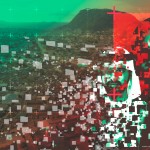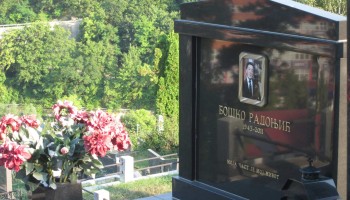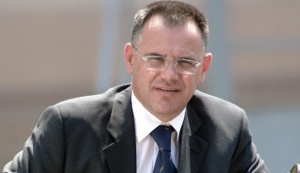 Ivo Pukanic - Credit: NacionalAccording to Krunoslav Borovec, head of the police chief’s office, three of the men resisted and police used force to subdue them; two suspects and two officers were hurt in the struggle. Four were arrested near the Serbian border and the others in the Zagreb area.
Ivo Pukanic - Credit: NacionalAccording to Krunoslav Borovec, head of the police chief’s office, three of the men resisted and police used force to subdue them; two suspects and two officers were hurt in the struggle. Four were arrested near the Serbian border and the others in the Zagreb area.
Although police declined to identify the men, Zoran Pilipović, lawyer for Luka Matanić, 23, Amir Mafalani and S. Đurović, confirmed that the three, along with Robert Matanić, Luka’s cousin, were arrested and suspected in the Pukanić assassination. Matanić was reported to want to cooperate with police to clear his name and Pilopović said he disagreed with that strategy and would not represent Robert Matanić.
The Matanić cousins were described as hitmen from Croatia.
The cousins were arrested about 100 kilometers from the Serbian border as they were trying to flee. Press reports said that police had been monitoring the suspects and their phone conversations and moved in when some of the men headed to Serbia
Several Tied to Sreten Jocić Luka Matanic - Credit: 24 Hours in BulgariaTwo of the others arrested were Serbians and were being questioned about who ordered the murder of Ivana Hodak on Oct. 6 and the bombing of Pukanić and Franjić. They were described by the Serbian daily Blic as members of the criminal clan of Sreten Jocić, 46, aka Joca Amsterdam, a drug lord and hit man thought to be responsible for murders in Bulgaria, the Netherlands, Croatia, Serbia, Germany and Bosnia. One of the two, Boba Đurović from Bar in Montenegro, was described as Jocić’s lieutenant and the man who ran his finances. The other was Milenko Kuzmanović from Belgrade.
Luka Matanic - Credit: 24 Hours in BulgariaTwo of the others arrested were Serbians and were being questioned about who ordered the murder of Ivana Hodak on Oct. 6 and the bombing of Pukanić and Franjić. They were described by the Serbian daily Blic as members of the criminal clan of Sreten Jocić, 46, aka Joca Amsterdam, a drug lord and hit man thought to be responsible for murders in Bulgaria, the Netherlands, Croatia, Serbia, Germany and Bosnia. One of the two, Boba Đurović from Bar in Montenegro, was described as Jocić’s lieutenant and the man who ran his finances. The other was Milenko Kuzmanović from Belgrade.
The Matanić cousins were suspected as part of a group of hitmen that liquidated Bulgarian drug lords when Jocić, was moving into the drug scene in Bulgaria in the mid 1990s.
On Thursday, police arrested Elvis Hadžić, 35, of Velika Kladuša, for questioning in the bombing. Croatian media said police said he also was connected with the Matanić group.
Croatian police were raiding apartments, houses and weekend houses and seven cars as the investigation continued.
Sreten Jocić Part of Nacional Story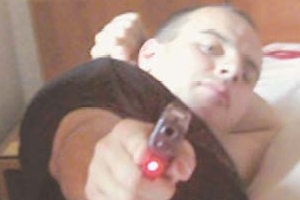 Robert Matanic - Credit: 24 Hours in BulgariaJocić, and more specifically his friend, were figures in a story that Nacional had published and was working on. Before the Pukanić assassination, Nacional had raised the possibility that Jocić was connected with the murder of Ivana Hodak, who was gunned down Oct. 6 at her apartment in downtown Zagreb.
Robert Matanic - Credit: 24 Hours in BulgariaJocić, and more specifically his friend, were figures in a story that Nacional had published and was working on. Before the Pukanić assassination, Nacional had raised the possibility that Jocić was connected with the murder of Ivana Hodak, who was gunned down Oct. 6 at her apartment in downtown Zagreb.
Recently, according to Jutarnji List, Jocić contacted former members of the Surčin clan and they started using drug money to gain the privatization of a number of Serbian companies. The paper said Jocić recently got into buying Croatian shopping centers.
Nacional’s stories said that Jocić’s close friend, Uglješa Aranitović, was trying to work with Igor Vucelić to buy property from Vladimir Zagorec, a former Croatian general who is in prison on war crimes charges. Zagorec was represented by Ivana Hodak’s father, Zvonimir.
Nacional speculated that because Ivana Hodak broke off her relationship with Vucelić and began a relationship with Ljubo Pavasović it cost the two men the deal. Pavasović was a lawyer for a rival Croatian general, Hrvoje Petrač, and that that may have caused the deal to fall through.
Aranitović was killed in Belgrade on August 19. Ivana Hodak was killed October 6.
The week after the story ran, on October 23, a bomb exploded in front of Nacional’s offices in downtown Zagreb, killing Pukanić and Franjić.
Jocić History: Murders, Connections
According to various published reports and to sources, Jocić’s history goes back to the mid-1980s, when he worked in Amsterdam for Ljubinko "Duja" Bećirović and was suspected of killing a man in Amsterdam in 1990, on Bećirović’s orders.
In October of that year, Bećirović died after he was wounded in an attack ordered by Klaas Bruinsma. Jocić subsequently became boss.
Bruinsma did not live long; he was killed in a hit in June 1991, a murder by Jocić’s friend, gang member and former police officer Martin Hoogland.
Then, on November 22 of that year, an attempt by police to arrest Jocić degenerated into a shootout and left several police and Jocić’s bodyguards wounded. Jocić was sent to prison on the Amsterdam murder charge but released in 1992 and went to Bulgaria, a year before he was convicted in absentia of wounding a policeman in that shootout.
At that time, Bulgaria was a transhipment point for stolen cars to former Soviet republics and to the Middle East, from where oil was shipped back. But drugs were becoming the major item trafficked.
Gangs Join Forces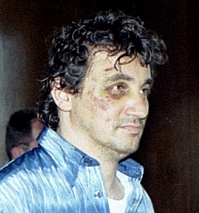 Sreten Jocic, in Sofia court in 2002 - Credit: 24 hours in BulgariaJocić and his crew became part of that scene, joining forces with other gang leaders such as Milorad Luković, aka Legija of the Zemun clan, and Pantyo “Poli” Pantev and Ilcho Bonev, aka Bay Mile, to control narcotics routes.
Sreten Jocic, in Sofia court in 2002 - Credit: 24 hours in BulgariaJocić and his crew became part of that scene, joining forces with other gang leaders such as Milorad Luković, aka Legija of the Zemun clan, and Pantyo “Poli” Pantev and Ilcho Bonev, aka Bay Mile, to control narcotics routes.
The gangs ruthlessly killed off competition, committing more than 60 murders in the mid-90s. For example, a group of Kosovo Albanians tried to move into the narcotics market in Bulgaria through connections with a security and insurance firm named VIS that according to police was a front for a criminal group involved in extortion and fuel and car smuggling. In 1995, VIS’s founder Vasil Iliev, was shot in his car while driving in Sofia. According to Bulgarian police sources, Jocić and Bonev allegedly ordered Iliev’s murder.
But Jocić’s own business partners were not immune. Pantev, the owner of another security and insurance firm named SIK was shot four times as he entered an elevator at the Hotel Sonesta in Aruba, allegedly on the order of Jocić, according to newspaper and police sources.
In 2002, Jocić was arrested in Bulgaria and extradited to the Netherlands.
He had been betrayed, according to various accounts, by Bonev or Legija. From prison, he arranged the killing of Bonev in a spectacularly orchestrated ruse in which men in police uniforms appeared at the sports complex Slavija, which Bonev used as his headquarters, and shot him down with Kalashnikovs.
After police broke up the Zemun clan and Legija surrendered in 2004, he reportedly said he would be safer in prison.
In the Netherlands, Jocić served time for his 1993 in absentia conviction for the murder or an Amsterdam police officer. He was released, with the court taking into account time served in pre-trial custody, in March 2004. He was soon charged on suspicion of heroin smuggling. He was in prison again until March 2006, when he was extradited to Serbia. He was also suspected of plotting the assassination of a Dutch prosecutor, but Netherlands prosecutors said they had no irrefutable evidence.
Jocić was suspected in Serbia of ordering the murders of Goran Marjanović, aka Goksi the Bomber, and another man. He was detained, but released May 26, 2006, on €300,000, supposedly because a witness changed his testimony. Another indictment was filed and he was scheduled to go on trial in June. The trial was postponed and is rescheduled for December 2.
He reportedly has been seen recently in Serbia.

